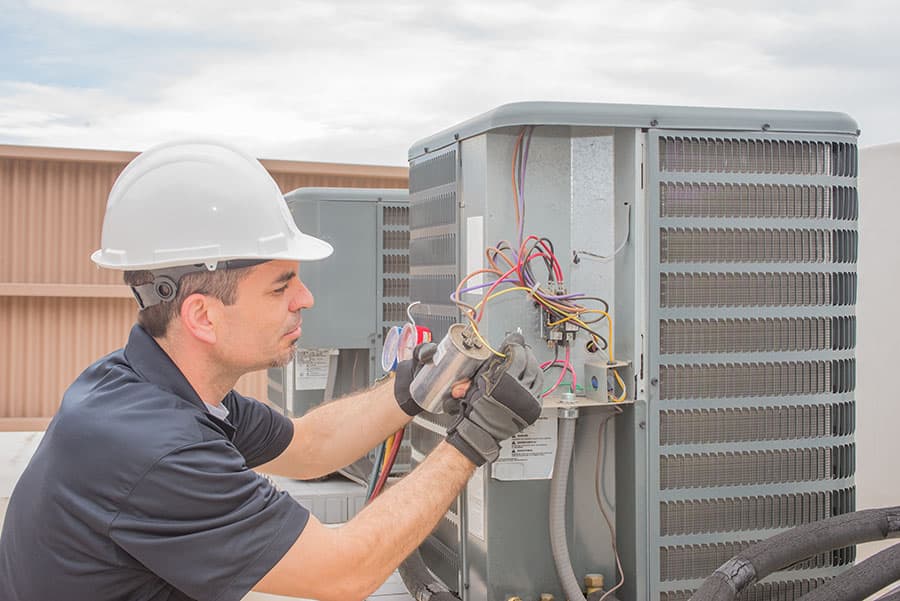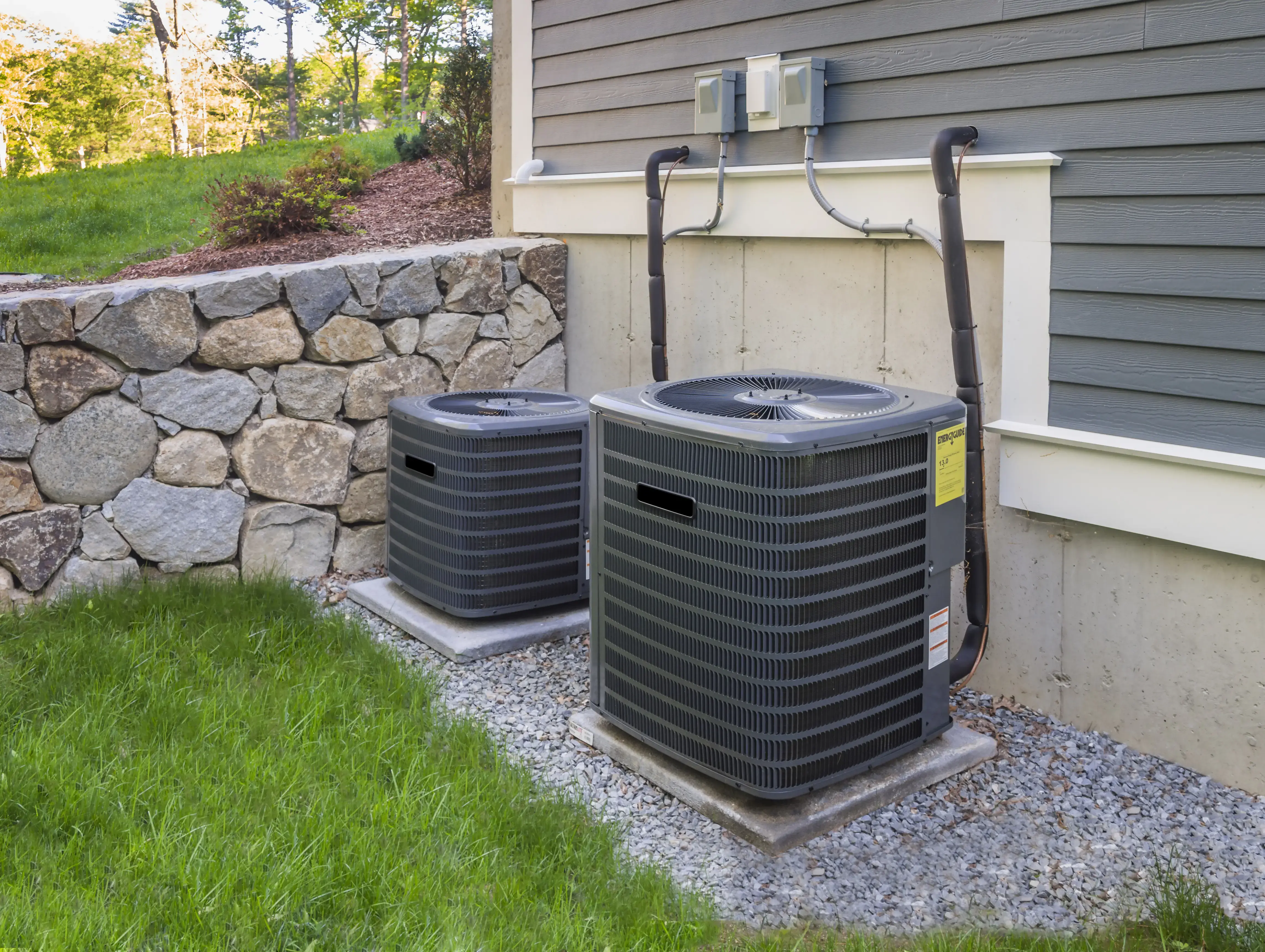Explore how HVAC experts provide fast repair options
Wiki Article
Exploring the Vital Components of an Effective Heating And Cooling System
An efficient heating and cooling system is constructed on a number of critical parts that operate in harmony. Each part, from the thermostat to the ductwork, plays a necessary role in maintaining convenience and power effectiveness. Comprehending these components is crucial for optimizing performance and enhancing indoor air high quality. As one takes a look at these elements, the detailed connections between them disclose understandings into boosting general system performance. What specific factors add most to this efficiency?The Function of the Thermostat in Heating And Cooling Performance
Commonly overlooked, the thermostat plays an important function in the effectiveness of Heating and cooling systems. This tiny device works as the primary nerve center, controling temperature settings and making sure suitable comfort within a room. By precisely noticing the ambient temperature, the thermostat connects with the air, ventilation, and home heating conditioning units to preserve the wanted climate
An efficient thermostat minimizes energy usage by turning on the HVAC system just when needed, therefore preventing too much home heating or cooling. Modern programmable and smart thermostats enhance this performance even more by enabling customers to establish timetables and from another location readjust setups, adjusting to daily routines.
The positioning of the thermostat is necessary; improper location can lead to imprecise temperature readings, resulting in ineffective procedure. In general, a well-functioning thermostat not just enhances comfort but additionally adds significantly to energy savings and the longevity of the heating and cooling system.
Comprehending the Value of Air Filters
Air filters offer a vital function in heating and cooling systems by guaranteeing that the air distributing within an area stays healthy and tidy. These filters catch dirt, irritants, and various other contaminants, avoiding them from being recirculated throughout the atmosphere. By recording these fragments, air filters add to improved indoor air high quality, which can considerably profit residents' health and wellness, particularly those with allergies or respiratory system conditions.Additionally, preserving clean air filters improves the efficiency of cooling and heating systems. Clogged up filters can restrict airflow, triggering the system to function more challenging to keep wanted temperature levels, leading to boosted energy intake and greater energy bills. Consistently replacing or cleaning up filters is a crucial maintenance step that can prolong the lifespan of heating and cooling equipment. Inevitably, recognizing the importance of air filters permits house owners and building supervisors to take proactive steps to ensure a well-functioning, reliable cooling and heating system that advertises a comfy and secure indoor environment.

The Functionality of the Heater and Heatpump
Furnaces and heatpump are vital parts of HVAC systems, accountable for giving warmth throughout colder months. Heating systems run by heating air with burning or electric resistance, then dispersing it throughout the home using ducts. They generally use rapid home heating and can be fueled by natural gas, power, or oil, depending on the system type.Conversely, heatpump move heat instead than generate it. They draw out warmth from the outside air or ground, even in low temperatures, and transfer it inside your home. HVAC experts. This double performance enables heat pumps to also supply air conditioning in warmer months, making them functional options for year-round environment control
Both systems require appropriate maintenance to ensure effectiveness and long life. While furnaces stand out in extreme chilly, heatpump can be advantageous in moderate environments. Recognizing their distinct performances aids home owners in choosing the most suitable alternative for their home heating requires.
Discovering the Air Conditioning Unit
The air conditioning unit is a vital part of a/c systems, offered in numerous kinds to fit different needs. Comprehending the performance ratings of these systems is necessary for making informed selections regarding energy usage and cost. This area will certainly discover the diverse kinds of air conditioning system and check this clarify just how performance scores influence efficiency.Sorts Of Air Conditioners
While different factors affect the selection of air conditioning systems, recognizing the various types available is crucial for homeowners and structure managers alike. Central air conditioners are made to cool whole homes or buildings, using a network of ducts for air movement. Home window systems offer an even more local service, ideal for solitary rooms or small rooms. Mobile a/c offer versatility, allowing individuals to relocate the device as needed. Ductless mini-split systems are an additional choice, integrating the efficiency of main systems with the benefit of zoning, as they call for no ductwork. Lastly, geothermal systems harness the planet's temperature for energy-efficient air conditioning. Each type comes with unique advantages, making educated options essential for efficient environment control.
Effectiveness Rankings Clarified
Understanding effectiveness rankings is vital for selecting the right a/c unit, as these metrics supply insight right into the system's performance and power intake. The most usual score for ac system is the Seasonal Power Efficiency Ratio (SEER), which measures the cooling result during a regular air conditioning season divided by the complete electrical energy input. A greater SEER suggests much better efficiency. Furthermore, the Power Efficiency Ratio (EER) is used for gauging efficiency under certain conditions. Another crucial metric is the Power Celebrity accreditation, which signifies that an unit meets stringent power effectiveness standards. By evaluating these ratings, consumers can make educated choices that not only enhance comfort however likewise minimize energy expenses and ecological effect.The Importance of Ductwork and Airflow
Reliable ductwork style and air important source movement management play essential roles in the general effectiveness and efficiency of heating and cooling systems. Appropriate ductwork warranties that conditioned air is dispersed uniformly throughout a room, decreasing temperature level variations and boosting convenience. Properly designed air ducts decrease resistance to air movement, decreasing the work on cooling and heating devices and ultimately reducing power consumption.Airflow management involves strategically putting vents and signs up to improve the circulation of air. This avoids typical problems such as hot or chilly spots, which can browse around these guys occur when airflow is obstructed or inadequately well balanced. Additionally, the ideal air duct materials and insulation can even more boost efficiency by reducing heat loss or gain throughout air transit.
A reliable ductwork system not just adds to energy financial savings but can additionally extend the life-span of cooling and heating tools by decreasing unnecessary pressure (HVAC experts). Understanding the significance of ductwork and airflow is necessary for achieving peak HVAC system efficiency.
Routine Maintenance Practices to Boost Performance
Regular maintenance methods are necessary for making certain peak performance of heating and cooling systems. These techniques consist of regular assessments, cleansing, and required repairs to maintain the system running effectively. On a regular basis transforming air filters is crucial, as clogged filters can block air flow and reduce effectiveness. Furthermore, specialists must check and clean evaporator and condenser coils to stop overheating and energy waste.Yearly expert inspections are likewise recommended, as qualified specialists can identify prospective issues before they intensify. Lubing moving components reduces damage, adding to a much longer lifespan for the system. Additionally, guaranteeing that the thermostat works properly help in maintaining suitable temperature level control.

Regularly Asked Questions
Exactly how Commonly Should I Replace My Thermostat?
Thermostats ought to typically be changed every 5 to 10 years, depending on usage and modern technology innovations. Regular checks are advisable to ensure peak efficiency, particularly if experiencing irregular temperature control or increased power costs.What Dimension Air Filter Is Best for My Cooling And Heating System?
The most effective dimension air filter for a cooling and heating system differs by device style. Typically, it's essential to get in touch with the proprietor's guidebook or examine the existing filter measurements to assure peak performance and air high quality.Can I Mount a Heat Pump Myself?
Setting up a warmth pump independently is feasible for competent people, yet it calls for understanding of local codes and electric systems. Hiring a specialist is recommended to ensure correct installment and suitable system performance.How Do I Know if My Ductwork Is Efficient?
To establish ductwork effectiveness, one ought to look for leakages, action air flow at vents, check insulation quality, and evaluate temperature level distinctions between supply and return air ducts. Specialist evaluations can offer thorough understandings into overall performance.What Are Indicators My HVAC Demands Immediate Maintenance?
Indicators that an a/c system requires instant upkeep include uncommon noises, irregular temperature levels, boosted power expenses, undesirable smells, and frequent biking. Addressing these problems without delay can prevent additional damages and guarantee optimal system performance.Air filters serve an essential feature in Heating and cooling systems by ensuring that the air flowing within a space remains clean and healthy. In addition, preserving clean air filters improves the effectiveness of Cooling and heating systems. Ductless mini-split systems are another choice, combining the effectiveness of central systems with the ease of zoning, as they require no ductwork. Comprehending effectiveness scores is essential for choosing the best air conditioning device, as these metrics provide insight into the system's performance and power consumption. The best size air filter for an A/c system varies by unit layout.
Report this wiki page